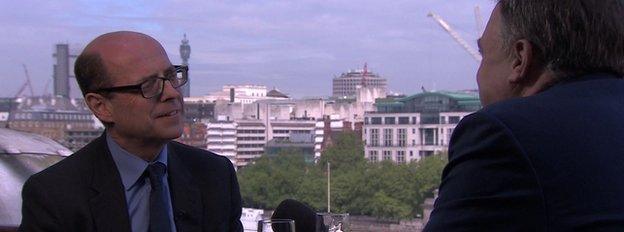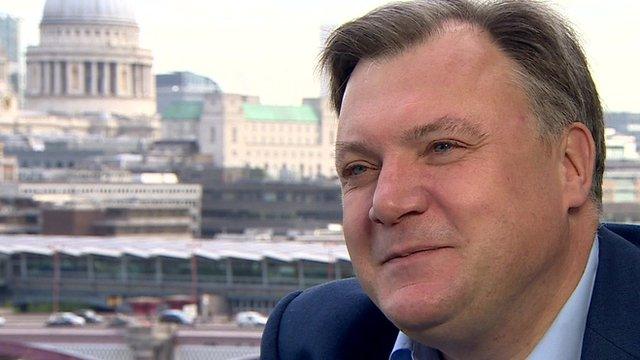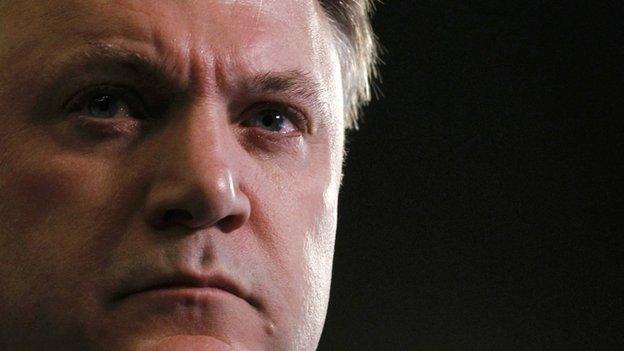Ed Balls 'not dashing back to politics'
- Published
Ed Balls: "Although losing was hard... I'm a symbol of the vibrancy of our democracy"
Ed Balls has told the BBC he will not be "dashing back" to frontline politics after losing his seat at the election.
He said he had wanted Labour's campaign to be more "pro-business" but he had backed Ed Miliband "100%" and he shared responsibility for the party's defeat.
"In the end he didn't persuade people he could be the prime minister but I didn't persuade people I could be the chancellor either," said Mr Balls.
He was speaking exclusively to BBC political editor Nick Robinson.
In his first interview since election night, the former shadow chancellor spoke of his "sense of loss" at Labour' defeat and described losing his seat two weeks ago as "a symbol of the vibrancy of our democracy".
He said: "I always knew if the Tories won a majority I was probably a goner, but the reason I travelled 7,500 miles and went to 45 seats was because I was fighting to win."
'Responsibility'
He added: "Politics is a brutal business," because "it was a real possibility" his party might win, and he might become chancellor.
Commenting on the campaign, he said: 'I think I wanted to be more pro-business but I also backed Ed Miliband 100%.
"He was the leader I was the shadow chancellor we both worked very hard and in the end neither he or I persuaded people and we need to take our responsibility for that. It's not all on him it's on all of us."

Analysis

By BBC political editor Nick Robinson
Were you up for that Ed Balls moment - the symbol of Labour's crushing electoral defeat, the trigger for wild Tory celebrations and Labour despair?
Ed Balls was in reflective mood when we spoke - looking back at what he'd achieved as much as forward to what might be next.
For the rest of Nick's article and a full transcript of the interview, click here.

In one of the shock results of election night, the former shadow chancellor lost his Morley and Outwood seat in West Yorkshire by 422 votes to Conservative Andrea Jenkyns.
He had previously had a majority of 1,101 in the constituency on the outskirts of Leeds.
Asked by Nick Robinson if he was one of the reasons Labour was unelectable, Mr Balls replied: "Of course.
"I mean Ed Miliband said straight after the election he took responsibility but all of us have to bear our share of responsibility.
"Ed was the leader I backed him as shadow chancellor 100%. In the end he didn't persuade people he could be the prime minister but I didn't persuade people I could be the chancellor either. I have to take that on the chin.
"People will analyse for weeks and months what happened and that's something that still feels too early for me."
Toughest job
Speaking about his own future, Mr Balls said: "I'm not going to be dashing back" to frontline politics but "never say never".
He was, he said, embarking on "a new chapter, outside of politics. No by-elections, not back in parliament, that is how it feels at the moment. Outside of politics is where I am going next."
He says his wife Yvette Cooper, who is running to be Labour leader, is "brilliant and people will get a chance to see what she stands for" but he insisted that "I am not playing a role in her campaign" except "whilst she is busy I can do more to help family".
Asked whether whether he worries that she is applying for the toughest job in British politics he said: "You have to take your calling when it comes."
Mr Balls did not rule out appearing on Strictly Come Dancing - a prospect his wife has described as "truly terrifying" - but he told Nick Robinson that despite running three marathons "I'm not sure if I'm equipped for Strictly."
He said he'd be spending his time "cooking, running, playing the piano" and using "real time to stand back and think" to write about economics.
He reflected, finally, on his image - and how he was perceived by the electorate: "It is very hard in politics for people to see the real you. You are seen through the prism your opponents set up."
Mr Balls' demise spelled the end of a decade in Parliament which has seen him at the heart of the Labour machine.
He held the position of chief economic adviser to the Treasury in the Blair government from 1997, working on policies including Sure Start, tax credits and the national minimum wage.
Ed Balls first became an MP in 2005 and a year later was made Economic Secretary to the Treasury.
He was a close adviser to then-chancellor Gordon Brown and earned a reputation as a political bruiser.
- Published22 May 2015
- Published22 May 2015

- Published8 May 2015
